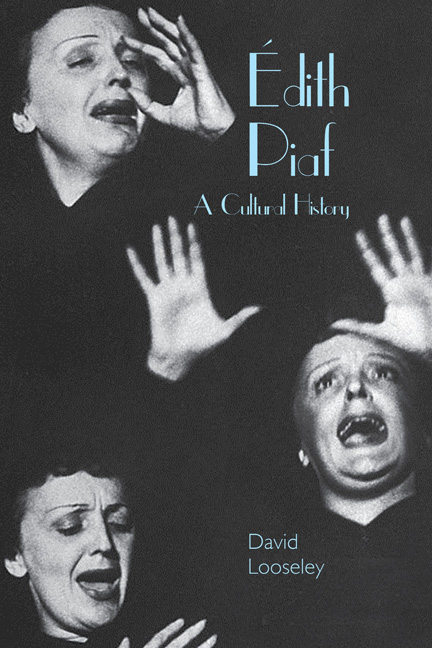7 - Losing Piaf
from Part III - Afterlives
Summary
One fine evening she'll leave us, and the chanson française will have lost its raison d'être’, a journalist mournfully predicted a decade before her death on 10 October 1963. We need to think about the meanings of that death, for French chanson and more widely. In a sense, she quit the scene at the best possible moment. France's abrupt experience of decolonisation, migration, consumerism and the baby boom marked the end of a conception of chanson that had been evolving since Bruant and had reached its apogee in the 1950s, just before the advent of pop and rock. As we've seen, this was the golden age of both the singer-poet and the interprète. Most of them—Barbara, Brassens, Brel, Ferré, Gréco, Montand and the posthumous Piaf—would survive the pop revolution that ushered in the Beatles, Dylan, Hardy, Sylvie Vartan, Sheila and Hallyday. But we have to ask whether Piaf, older than Brel and Barbara by almost a generation and imprisoned in the realist tradition, would have done so had she lived.
Her last years weren't happy ones. A full decade before she died, a doctor had privately described her as a ‘living corpse’. Her health continued to deteriorate, making the years 1958 to 1960 peculiarly harrowing. Three car accidents in less than a year weakened her further. She was taken ill on stage several times and was in and out of operating theatres with serious conditions. During her gruelling French tour in late 1959, dubbed her ‘suicide tour’ in the press, she had to leave the stage during a concert in Maubeuge and collapsed straight after the last show of the tour in Dreux. In the first of her televised interviews with Pierre Desgraupes, recorded just two days before, her speech was slurred, she wrung her hands constantly and she looked vulnerable. Often, she wasn't expected to survive, and when she did the media called it a miracle. Her concerts were by now major events, with crowds drawn there to celebrate her survival but also, secretly, to witness her dying—the ultimate authenticity. She knew this perfectly well, acknowledging that if a show didn't sell out, she only had to fall ill on stage and the punters would come running.
- Type
- Chapter
- Information
- Édith PiafA Cultural History, pp. 135 - 152Publisher: Liverpool University PressPrint publication year: 2015

